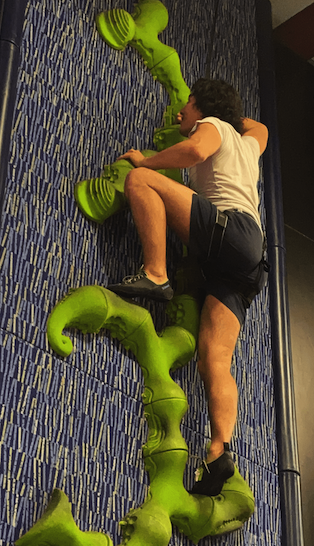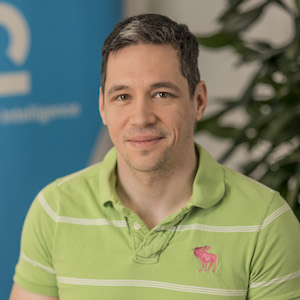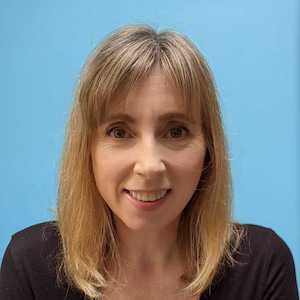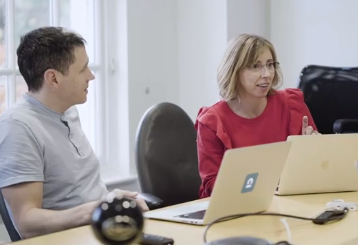Imagine you’ve landed a fantastic job at a successful organization. Things are going well – you have a great relationship with your manager, love working with your team and believe in the company’s mission.
But you’re ambitious. You’d like to try something different and face new challenges.
So here’s the dilemma: do you leave, retrain, and then start job hunting again? If you want to switch careers, that’s probably the only option – right?
At Cambridge Intelligence, there is another way. We have a proven track record of helping people achieve their career goals, even if that means doing something wildly different.
Let’s find out how Tom, Scott and Catherine got the support and encouragement they needed to switch roles successfully.
Becoming a developer – Tom

When I first started at Cambridge Intelligence I had little to no experience with coding. I’d done a small bit inside Excel but nothing beyond basic spreadsheet manipulation. I had considered getting more involved with programming but my previous roles never gave me the opportunity to explore it in any great depth.
My transition began with wanting to get in the mindset of our users to improve our technical documentation. As anyone involved in UX knows, high-quality documentation is there to make life easier for users, offer first-line support and improve usability.
I suspect that others saw the potential for me to make my career transition even before I asked.
Due to the flexibility of the team, I got increasingly involved in tasks that the developers would traditionally undertake. This was primarily to support my authoring work, but as I got more experience I realized that this was something that really engaged me in a way that I hadn’t previously encountered. I’d enjoyed technical challenges from previous roles in engineering and this new area combined those interests with the increased user focus of software development.
Looking for a technical role?
I suspect that others saw the potential for me to make my career transition even before I asked. As I became more involved in programming, I was able to explore and develop exactly how I wanted during our Friday projects. Every Friday, we set aside our project tasks and spend the day developing our own ideas. Having the freedom to write code gave me the appetite to learn more.

Officially the transition to developer lasted only three months, although in reality it was a gradual, organic shift over two years. By the time I spoke to my manager about moving to a developer role, I’d already gained much of the experience and skills I’d need to become one. They were very supportive – planning how best to make it happen and identifying what help I may need along the way.
To help with the role transition, we decided it was a good idea to move to a different development team. Although everybody in that team already knew me as a Technical Author, I hadn’t worked with them for a while. This helped me integrate better, providing a tangible change that separated my old role from my new one.
I still use my experience as a Technical Author to push for improved user experience, sometimes directing that inwards to improve the processes and practices for our own developers.
I almost don’t consider the transition to be a role switch at all. Both roles in their traditional sense aim to support the customer and improve our already great products, and so my objectives never really changed. I still get to work with a great team of developers on interesting and exciting software – that’s something I’m really happy about.
From recruitment to dev manager – Scott

Working in recruitment and HR for a decade gave me a lot of insight into why people decide to look for new jobs. The most common reason was ‘lack of career path or opportunities.’
It also offered me a window into the career management practices of various organizations, with approaches ranging from inspiring to downright depressing. People tend to get trapped in roles because of well-meaning policies for managing complexity and a lack of initiatives to actively promote mobility. You might be hired for a particular position (perhaps to get your foot in the door), but a good manager doesn’t assume that the scope of the role is the limit to your abilities.
Part of the reason I applied for the Talent Acquisition Manager role at Cambridge Intelligence was because the culture and attitude towards personal and professional growth suited me. I like the amount of agency given to individuals in the growth and management of their careers. In everyday activities, good ideas get the attention they deserve and can translate into changes in the company. Tom mentioned Friday projects earlier. The fact that some developer initiatives start out as experiments, but can become popular product features, is testament to how the company listens and takes notice.
You get to work out how your role can be expanded to add value to the company.
We get an annual professional development budget and a time-off allowance for studies, conferences and the like. This is flexible and largely self-directed, so you get to work out how your role can be expanded to add value to the company. It’s an approach that’s perfect for people like me who’d rather craft their own careers than be encouraged down a rigid path.
It was against this backdrop that I quickly got the opportunity to take on expanded responsibilities in HR, including helping others with career development. My advice in this area was always simple: be proactive. Work out what the important problems are that you can solve. Find that interesting piece of work that motivates you. Come up with a plan for doing those things and present it.
As much as I enjoyed my HR role, it’s hard to work for a software company and not be drawn to the action. Seeing what could be done with our data visualization SDKs was hugely compelling. I’d done a little bit of coding in the past, but never got very far with it. Having access to these powerful APIs gave me more incentive, because even a novice programmer like me could produce beautiful and responsive visualization demos. It was enough to make me want to get more closely involved.

What I thought I could offer was the ability to help manage the careers of talented engineers and do everything I could to facilitate their growth and development.
So, when the position of Software Development Manager became available, I applied. I wasn’t successful, and it was the right decision at the time. We urgently needed someone experienced who could hit the ground running.
But it wasn’t a flat-out rejection.
Our CEO, Joe Parry, told me there would be another vacancy in about a year. I took my own career advice and came up with a detailed transition plan. My manager gave me lots of support, allowing me the time I needed to train for the new role.
My future (now current) manager made it clear from the beginning that they had confidence in me; they refined my plan and committed their time to help get me prepared. Gradually, I was trusted with more responsibilities, and the development team were helpful, communicative, easy-going and a pleasure to work with.
One year on from when my transition started, I’ve still got plenty to learn, but I know I made the right decision.
Moving to marketing – Catherine

Back in 2016, I joined Cambridge Intelligence with 20 years of technical authoring experience. I’d documented software for different sectors and audiences – from telecoms to DSL semiconductors, SQL tools to desktop visual analysis tools. I’d managed teams of other authors and become a certified ScrumMaster.
But there were three things I hadn’t done that Cambridge Intelligence made possible: join a startup, set up new processes as the sole author at a company, and write technical content for a software development kit.
Fast forward two years, and things were ticking along nicely. Working in a small development team offered plenty of opportunities to specialize in the things I was passionate about. I got involved in every aspect of development: from early planning to designing and prototyping, development to release. I worked closely with developers to redesign and modernize the API documentation, and with Product Managers to identify and deliver strategic and tactical documentation projects. The range and quality of our learning resources improved, so customers could get up to speed more quickly.
One of the great things about being at a small company is that you can work with other teams without navigating through a barrage of red tape. My personal development plan (PDP) gave me the opportunity to help other parts of the business produce written material – everything from technical blog posts and video scripts to conference proposals and press releases.
Investing in our people, always.
Find out how the team use their PDP days
I enjoyed working with Marketing the most because it helped me develop skills to write for a commercial audience and think about content in a new way. So when the team needed a Content Manager responsible for the company’s marketing content strategy, it seemed the perfect opportunity to diversify my skill set but keep writing valuable technical content for the business.
When I felt I needed a new challenge, the company listened and did everything they could to make it happen.
When I spoke to my line manager about potentially switching roles, they were entirely supportive, even though it would leave the dev team without a technical author at a very busy time. But I wasn’t a ‘shoo-in’ for the role. The company has the highest standards, and I needed to prove that I could do this job.

So for my ‘interview’, I had to present a detailed proposal for a content strategy to the CEO, COO and Marketing Director. It was a tough challenge, but one I’m grateful for because it helped to confirm how much I wanted this career switch. My manager gave me the time I needed to run content audits, research potential strategies, and speak to stakeholders. It paid off – the presentation went well and I got the job.
The unique experience for me was that, at a time when I felt I needed a new challenge, the company listened, understood, and did everything they could to make it happen. There was never an attempt to talk me into staying where I was, even though that would have been a lot less hassle for everyone. It made a big difference having so much support throughout.
2.5 years later, I’m still grateful and happy with my new life in marketing and continue to learn new things every day.
Would you fit right in here?
If you like what you’ve heard so far, discover more about life at Cambridge Intelligence. You’ll also find details of great benefits including flexible working options, relocation packages and our generous bonus scheme.
We have openings across the business – from technical roles to sales. Have a look at our latest job vacancies.


